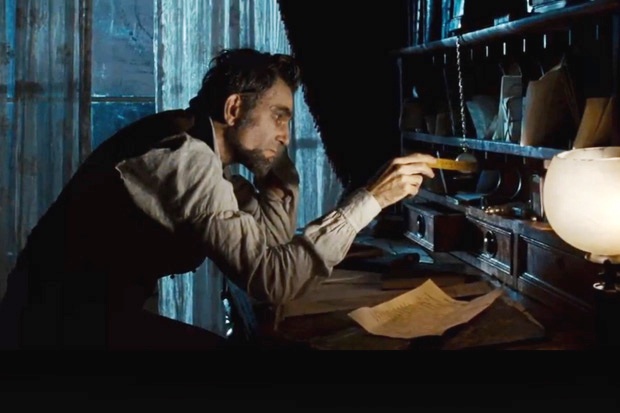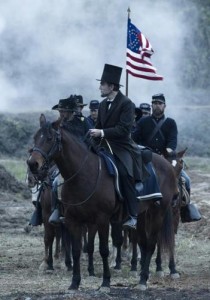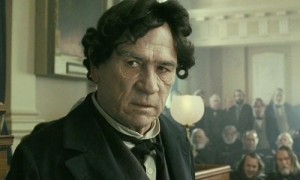
We should all be open to more history lessons at the cinema but Steven Spielberg’s film disposes too heavily of the visual style and entertainment grandstanding. Lincoln is a muddy, charcoal-looking historical drama with dense, verbose speeches that sound as real as they are off-putting. The movie stays as much inside pallid drawing rooms and congressional halls as it can, and the result is stodgy and hermetic – you’re trapped to the point you can practically inhale the interiors’ dust. Daniel Day-Lewis is admirable in his plain-spoken, carefully cadenced speech, and his hunched-over corporeality of the character is unparalleled. It’s very good acting technique, but nothing to love.
 The only true physical action of the movie is the very first scene depicting a Civil War battle, and Spielberg has done something raw and animal with the skirmish – drowning men’s faces in the mud, tag-teaming to impale an opponent. The “Four Score and Seven Years Ago” Gettysburg Address is recited by two union army soldiers, Lincoln garners trust and faith by listening first, sermonizing second. Lincoln, and everybody else, ponder over the enormity of lost lives. Then Spielberg’s film gets dungy for a long time.
The only true physical action of the movie is the very first scene depicting a Civil War battle, and Spielberg has done something raw and animal with the skirmish – drowning men’s faces in the mud, tag-teaming to impale an opponent. The “Four Score and Seven Years Ago” Gettysburg Address is recited by two union army soldiers, Lincoln garners trust and faith by listening first, sermonizing second. Lincoln, and everybody else, ponder over the enormity of lost lives. Then Spielberg’s film gets dungy for a long time.
Lincoln seeks advisors and aides to support his passing of the 13th Amendment in the House of Representatives, but in this time of history, the intolerant Democrats need convincing. Politicians as a whole are self-serving (how timeless!), so while Lincoln was against slavery his strategy was cloaked wording. Ending slavery would cripple the South’s economy and thus become dependent on Reconstruction. Lincoln is brief on slave rights, but he invites Secretary of State William Seward (David Strahairn) and Rep. Thaddeus Stevens (Tommy Lee Jones) to offer their own political discourses.
Home was hardly a sanctuary either with an angry, critical Mary Todd (Sally Field) as a wife and patriotic do-gooder Robert Lincoln (Joseph Gordon-Levitt) as a son. They are family, but as part of the screenplay they are mere side notes. Lincoln is a titan of goodwill in the scope of history and you find yourself remarking his own family brood are philosophical dissenters in his wake. He has much more common with Thaddeus, but you wonder why more scenes weren’t drawn up to include the both of them together.
As a viewer you sort through the long-winded muck of political stalemating until the victory of the passed amendment. Lincoln gets a carriage ride and a porch scene, says some quasi-important things (nothing anachronistic, it’s all archaic thoughts and manners), and somehow it jumps to the mentioning of Lincoln’s fated trip to the theater. We see the body of Lincoln looked over by physicians.
 “Lincoln” is educational enough to equate to a spoonful of medicine, but the only element that entertains and blows the mind wide open is Jones’ portrayal of a wise, mercurial but secretive Thaddeus whose wisdom looms large yet must, for his time, play ball. Spielberg’s movie is crying for Oscar attention, but Jones is the only one who is worthy of the gold. As for screenwriter Tony Kushner (“Angels in America”), he proves to be a compulsive wordsmith.
“Lincoln” is educational enough to equate to a spoonful of medicine, but the only element that entertains and blows the mind wide open is Jones’ portrayal of a wise, mercurial but secretive Thaddeus whose wisdom looms large yet must, for his time, play ball. Spielberg’s movie is crying for Oscar attention, but Jones is the only one who is worthy of the gold. As for screenwriter Tony Kushner (“Angels in America”), he proves to be a compulsive wordsmith.
149 Minutes. Rated PG-13.
HISTORICAL DRAMA / FOOD FOR THOUGHT / FALL SCHOLASTICS
Film Cousins: “Young Mr. Lincoln” (1939); “Roots” (1977); “Glory” (1989); “Amistad” (1997).





